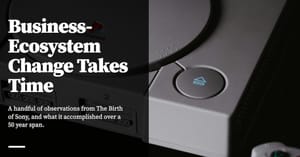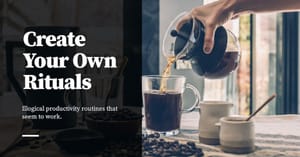A year after I left my old company, my ex-boss asked me out to dinner. “I’ve got a problem I want to bounce off of you,” he said.
We met up at his favourite Korean barbecue place. The business problem he laid out for me — over dishes of beef and glass noodles and pork — was new to the company, but it felt familiar to both of us. It was a case of choosing one mutually exclusive path over another. We’d struggled with many similar decisions over the course of the three years we had built his company together, but none as serious or as consequential as this one. At the end of it, he said something that has stuck with me since:
“The problem here is that every move is a good move.” he sighed, “Or more accurately, every move is equally bad; every move might go wrong. There is no way to tell which is the right move to make.”
It was a cool night in Singapore when we left the restaurant. I wasn’t very helpful to him during the dinner. The correct answer to his predicament lay beyond the barrier of knowability — not only for both of us, but for anyone observing our paths. After we said our goodbyes, I walked back to the nearest MRT station, choosing to take advantage of the cool breeze. I remember thinking to myself: “This is what uncertainty feels like.” And after a pause: “Try not to forget.”
*
Businesspeople deal with uncertainty all the time. In many ways, uncertainty is their friend: in the early days of a startup, for instance, uncertainty is the only protection they have against dangerous and well-funded competitors. No company starts out with a sustainable competitive advantage. They can only grow because potential enemies ignore their activities in the beginning. This inaction stems from the fact that any startup’s success lies beyond the barrier of knowability.
But the vast majority of us don’t think about or deal with uncertainty — at least, not on a day-to-day level. Our lives are rhythmic and predictable. We go to work, come home to our families, take regularly-scheduled and pre-planned annual holidays. Uncertainty only intrudes in inopportune moments — when a flight is rescheduled due to a volcanic eruption, perhaps, or when a loved one gets into a horrific accident. (Notice how quickly your mind shifts away from the very thought). When bad, unforeseen circumstances occur, we remind ourselves that “life is a gift; we may all go at any moment; we should be grateful for what we have,” and then we return to our routine schedules and try not to think too hard about the freak accidents that might occur tomorrow.
The upshot here is that the global pandemic offers us a unique educational opportunity.
As I write this in early May, 2020, we have all experienced the same dislocations in our schedules. We are locked down in our homes in varying degrees of severity. Many of us do not know what our next month would be like. We cannot imagine planning more than a few weeks ahead.
Looking further afield, we do not know how the world would change when we emerge from this shared experience. We do not know the full extent of the economic downturn, nor can we easily predict the political side-effects from this event. There are over a hundred op-eds at this point about ‘the new normal’ and ‘the coming dislocations’, but the odds are good that the authors are spitballing. They have no expectation of forecasting rigour.
This is what uncertainty feels like. In January, we could not have imagined that the world would be under lockdown today, with US first quarter GDP down 4.8% and the stock market in a ridiculous rally. A day before it happened, the broader world did not expect oil futures to go down to $-37 a barrel.
In a very particular sense, this experience that we’ve shared together over the past two months or so is a good thing. We now have an anchor to refer to whenever we want to remember what uncertainty feels like. And this is important, because humans need to feel in order to act effectively.
I’ve linked a lot to “This is what 5% feels like” over the years, because I think it captures something true about human effectiveness. You can reason about probability and fat tails and uncertainty all you want, the same way you may accept — intellectually — that uncertainty is what allows for great startups to exist. But it is another thing entirely to act on what you understand. In most cases, acting requires the internalisation of knowledge; this internalisation expresses itself as intuitive ‘feeling’. In the context of poker:
… I’m more interested in another form of self-talk where players tell themselves out loud how likely they are to win hands. It’s something I’ve seen players like Phil Laak do a lot.
For instance, when Laak gets his money in behind, instead of moaning about his bad luck, he often says things like, “Wow. This is what 5% feels like” — pointing out that he still has a 5% chance to win the hand. Why would he do this? Is he trying to stay positive and upbeat in the face of long odds? Maybe. But I have another theory. Whether he knows it or not, Phil Laak is actually calibrating. As the cards are dealt, he keeps updating the verbal commentary to reinforce in his mind what different probabilities “feel” like. By the river, he might be saying things like, “This is what 2% feels like”. He’s calibrating his mind to instinctively know what it’s like to be a 50:1 shot.
Human brains are more adapted to remember intuitive feelings over numeric calculations. Smart practitioners know this; they take advantage of it by tying the former to the latter. The current pandemic is an opportunity to do the same.
Over the next few weeks I will be spending a considerable amount of column space here on Commonplace to explore the topic of fast adaptation in the face of uncertainty. I’ve started work on a rather expansive reading program on this very topic, and I intend to test the best ideas I find there in my life. But all of that research unfolds from a central premise: you can’t act effectively if you are paralysed by the unknown. You have to get used to the fact that you will never know if you are making the best decision, and take action with that sinking feeling in your gut. To do that, you have to expect the sinking feeling. You must be familiar with what uncertainty feels like.
This is what uncertainty feels like. Let’s try not to forget.
Originally published , last updated .
This article is part of the Market topic cluster, which belongs to the Business Expertise Triad. Read more from this topic here→





